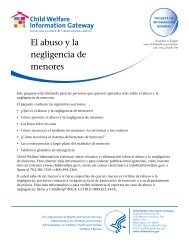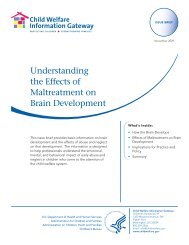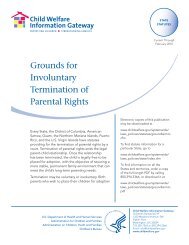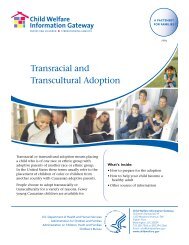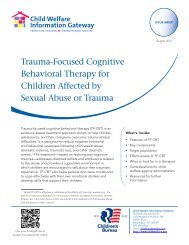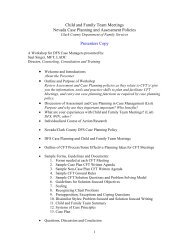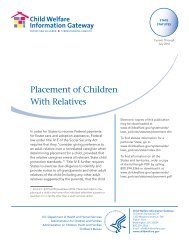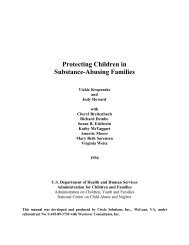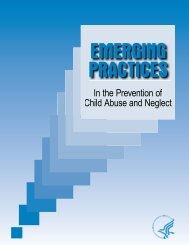Caseload and Workload Management - Child Welfare Information ...
Caseload and Workload Management - Child Welfare Information ...
Caseload and Workload Management - Child Welfare Information ...
You also want an ePaper? Increase the reach of your titles
YUMPU automatically turns print PDFs into web optimized ePapers that Google loves.
<strong>Caseload</strong> <strong>and</strong> <strong>Workload</strong> <strong>Management</strong> www.childwelfare.gov<br />
st<strong>and</strong>ards of no more than 12 active cases<br />
related to initial assessments/investigations<br />
<strong>and</strong> 17 ongoing cases. Turnover of family<br />
case managers decreased to 16 percent<br />
(DCS, 2009a). The State also observed steady<br />
improvements in monthly caseworker visits<br />
<strong>and</strong> improved permanency outcomes on CFSR<br />
composite measures.<br />
For more information, contact James Payne,<br />
Indiana DCS, 317.234.1391, james.payne@<br />
dcs.in.gov<br />
Delaware: Designated funding,<br />
Overhire Pool, <strong>and</strong> staff retention<br />
Challenged by high staff turnover rates <strong>and</strong><br />
concerns over well-publicized child fatalities,<br />
Delaware adopted an aggressive approach<br />
to managing caseloads that encompasses<br />
legislative support to meet caseload<br />
st<strong>and</strong>ards, hiring strategies, <strong>and</strong> initiatives to<br />
more effectively prepare <strong>and</strong> retain workers.<br />
Supported by legislation enacted in 1998<br />
<strong>and</strong> 2004 <strong>and</strong> amended in 2007, Delaware<br />
set caseload st<strong>and</strong>ards (currently 11 cases for<br />
investigation workers <strong>and</strong> 18 for treatment<br />
workers) as well as supervisor st<strong>and</strong>ards (five<br />
family services workers per supervisor).<br />
The legislation further tied allocation <strong>and</strong><br />
funding of new positions to these caseload<br />
st<strong>and</strong>ards. Each year, based on projections of<br />
child abuse <strong>and</strong> neglect cases, the General<br />
Assembly is authorized to fund adequate<br />
staff so that caseloads do not exceed the<br />
established st<strong>and</strong>ards.<br />
In a related innovative hiring strategy, the<br />
Division of Family Services (DFS) established<br />
an “overhire pool” to fill vacancies quickly <strong>and</strong><br />
stabilize caseloads. For up to 15 positions,<br />
the agency assigns two people to one<br />
budget position slot. Overhires are available<br />
immediately to step into a position when a<br />
worker resigns. They also carry cases while<br />
newly hired workers focus on training, fill in<br />
temporarily during a maternity or medical<br />
leave, <strong>and</strong> receive assignments to units<br />
experiencing high fluctuations in cases.<br />
In addition, Delaware also implemented<br />
several other recruitment, retention, <strong>and</strong><br />
training efforts:<br />
• Establishing a new career ladder with<br />
additional job categories for family<br />
service workers that enabled promotional<br />
opportunities<br />
Increasing salaries for workers with more<br />
than 1 year of experience<br />
This material may be freely reproduced <strong>and</strong> distributed. However, when doing so, please credit <strong>Child</strong> <strong>Welfare</strong><br />
<strong>Information</strong> Gateway. Available online at www.childwelfare.gov/pubs/case_work_management/<br />
•<br />
• Introducing a rapid replacement process for<br />
new workers, which draws on continuous<br />
interviewing <strong>and</strong> a hiring waiting list<br />
• Exp<strong>and</strong>ing pre-service training to 125<br />
hours <strong>and</strong> implementing formal mentoring<br />
<strong>and</strong> shadowing programs for new workers<br />
before they receive cases<br />
• Providing enhanced supervisor training,<br />
setting competency-based performance<br />
expectations, <strong>and</strong> engaging supervisors in<br />
turnover prevention<br />
These efforts were intended to keep staff<br />
levels stable <strong>and</strong> thereby better control<br />
caseloads.<br />
DFS administrators attribute the involvement<br />
of community partners to their success in<br />
caseload management <strong>and</strong> reduced turnover<br />
(S. Roberts, personal communication, Feb. 5,<br />
2010). In particular, the multidisciplinary <strong>Child</strong><br />
Protection Accountability Commission has<br />
been instrumental in advocating for needed<br />
change.<br />
12




